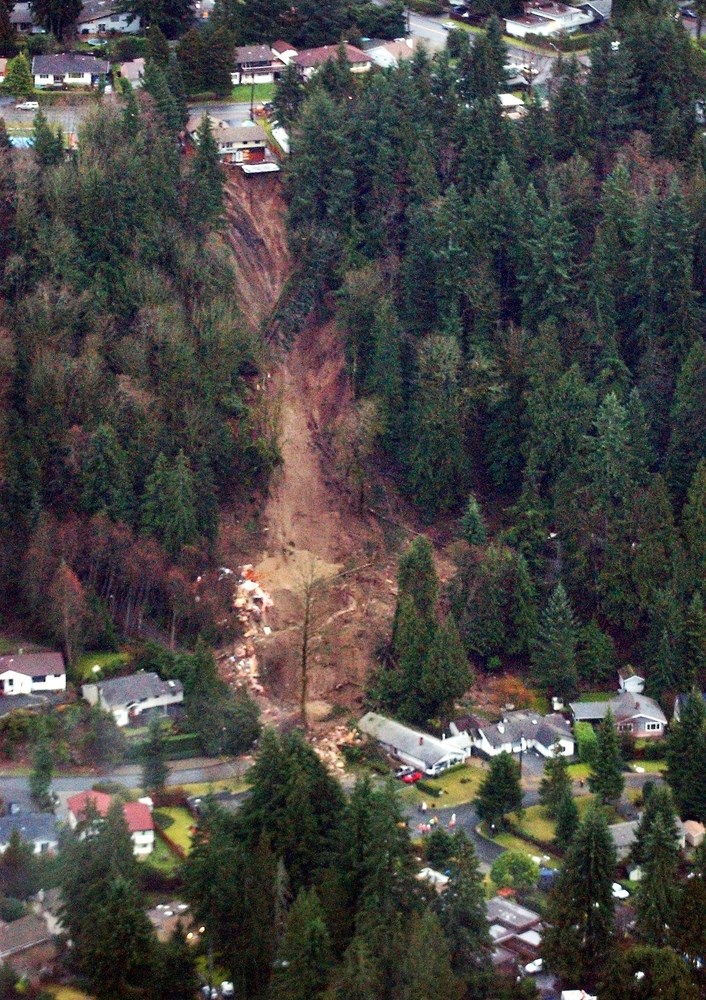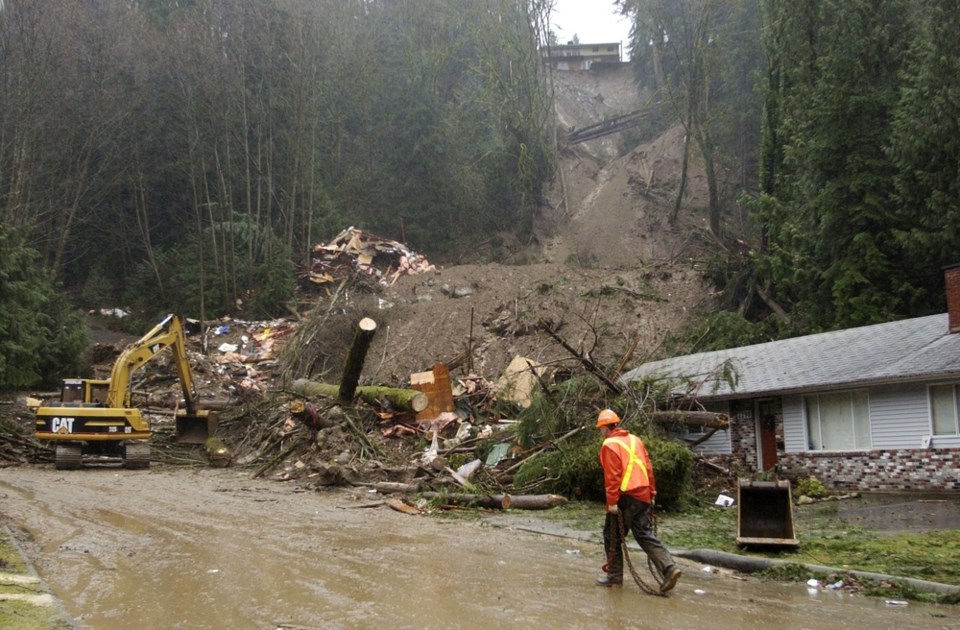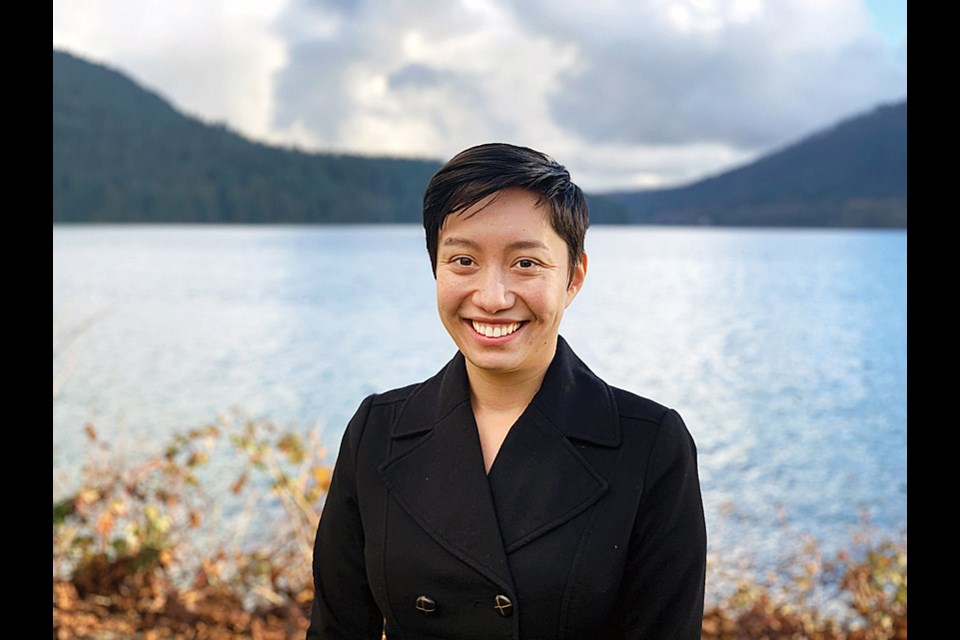When it rains heavily in the North Shore mountains, dripping down through the tree canopy into slopes where backyards drop off into ravines, the weather sometimes brings the memory of a particular grief for one former resident.
“Every time I see that there's an atmospheric river coming, I know what it means,” says Amita Kuttner (they/them).
It was a similar weather system that slammed into the Blueridge-Berkley escarpment after days of heavy rain on Jan. 19, 2005, unleashing a torrent of soil from an upslope backyard on Berkley Avenue and sending it crashing down through Kuttner’s childhood home in the middle of the night.
Their mother, Eliza Kuttner, a computer science instructor at what is now Capilano University, was killed after being buried in the mud while sleeping.
“My mother was my best friend. Absolutely the closest person to me in the whole world,” says Kuttner, now 30.
Their father, Michael Kuttner, in a twist of fate, had stood up in the bath just moments before the mudslide hit the house.
Neighbours found him underneath a section of smashed wall and scooped mud away from his face with their hands. He had been carried downhill about 50 metres by the slide and was mixed up in trees the size of phone poles that were snapped in two, neighbours said later.
He survived, but suffered life-altering head and spinal injuries, including a stroke.
While he recovered from some of his physical injuries, the stroke left Kuttner's father with lasting damage. “He lost his entire ability to use numbers, and he had a degree in mathematics and computer science,” they say.
Today, Kuttner lives in the same building as their father, near Granville Island, so they can help out with his care.
There is no doubt in Kuttner’s mind that if they had been home that night, they would also have also died in the mudslide.
After the mudslide, Kuttner recovered some belongings from their childhood bedroom. “The stuff in my bedroom was all completely smashed,” they said.
Neighbours later dug through the debris, pulling out sentimental items like family photos.
Kuttner says they still have a collection of their childhood stuffed animals that were pulled from the mud.

Kuttner wasn't at home on the night of the landslide. They had just turned 14, and were away at boarding school in California.
They remember being called out of class to the office that morning and being told their father was in hospital, their mother still missing. “They found my mother’s body in the afternoon.”
They remember their grandfather phoning, and the profound shock that descended, that would take years to break through. “It took me a long time to get out of the shock and be able to grieve,” says Kuttner, who found it too difficult to settle permanently in the Lower Mainland for many years after.
" I was always feeling awful and overwhelmed … everything was a reminder of everything I’d lost – the mountains, the weather, the smell in the air.”Eventually they found a way to process the post-traumatic stress they’d experienced and came home for good in 2018.
The past two weeks, however, have been hard.
"Probably the hardest is actually knowing what people are going through,” they said. “There is a visceral aspect to this. To see people interviewed watching their home washed away, people that died and the families that are left: I know all the moments.”
The landslide that killed Kuttner’s mother was a profound moment of reckoning for the wider community in North Vancouver too.
In the months and years after the slide, it was revealed that much had been known about the instability of the slope above the Kuttners’ home dating back 25 years, but little had been done to mitigate that risk. After earlier slides in the area an engineering report had recommended actions to stabilize the slope but those were not acted upon.
Following the slide, and a coroner’s report that pointed to factors contributing to Eliza Kuttner's death, comprehensive geotechnical studies by the district assessed the risks of slides on North Vancouver escarpments.
A number of properties deemed high risk were bought out and demolished, and fill was removed from the top of the Berkley slope. Properties were forced to hook into local storm drains. Meters that measure soil saturation were placed and debris catch basins installed.

Kuttner says they were glad to see that work done to mitigate future risk in North Vancouver.
But their personal tragedy created a lasting impression.
“I think there’s this assumption that no one’s going to be putting us in the way of danger or taking these risks for us. And yet, that’s what happened,” they say.
“With mudslides, you might see a slope and say, ‘OK. If it’s super rainy, there’s a chance that the slope destabilizes.’ But you are also assuming that if there’s actually a high chance of that, someone’s going to tell you.”
Until someone experiences such a disaster, it doesn’t feel real, they say.
It’s similar with flooding, as residents of Sumas Prairie, Merritt and Spences Bridge have found out.
In many ways, the most frustrating thing in the past two weeks has been knowing there could have been more preparation, said Kuttner, “Even warning, communication … to know that there was that possibility. We didn’t get it. It pulls at me because I want to do everything I can to see that people don’t go through this.”
Kuttner’s personal experience has informed their politics. Last week, Kuttner,, who identifies as gender non-binary, became the interim head of the federal Green Party after previously running for MP in Burnaby North-Seymour.
With climate change pushed to the forefront with recent floods and landslides, “I feel like we really have to have these transformational conversations,” they say. “I don’t feel I have a choice about it. We really are all in to deal with things that are right on our doorstep, coming in the floodgates.”



